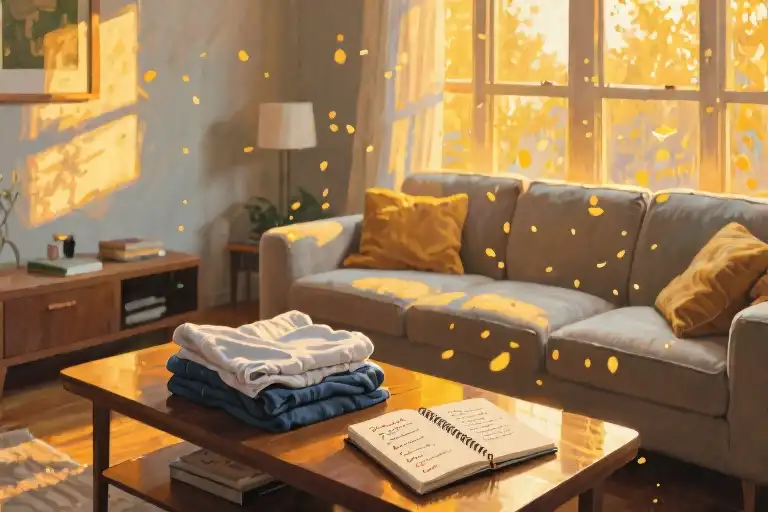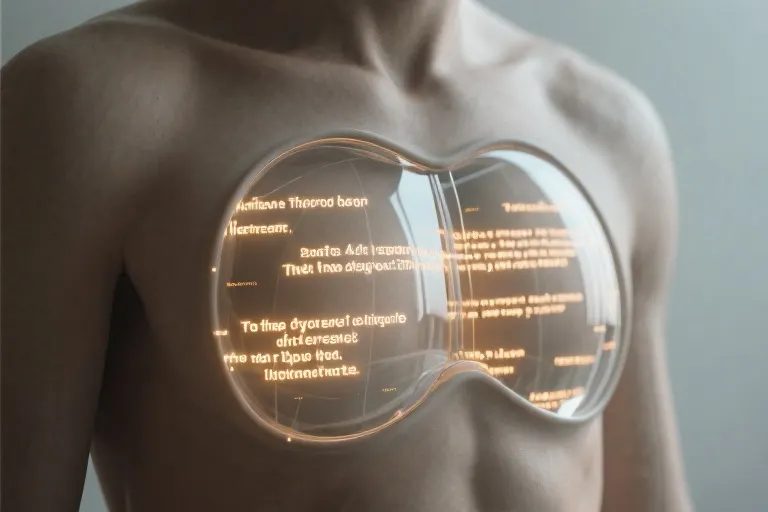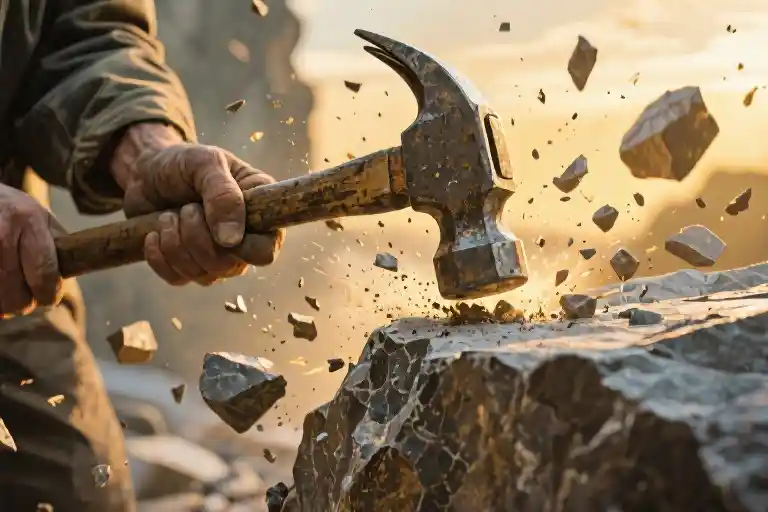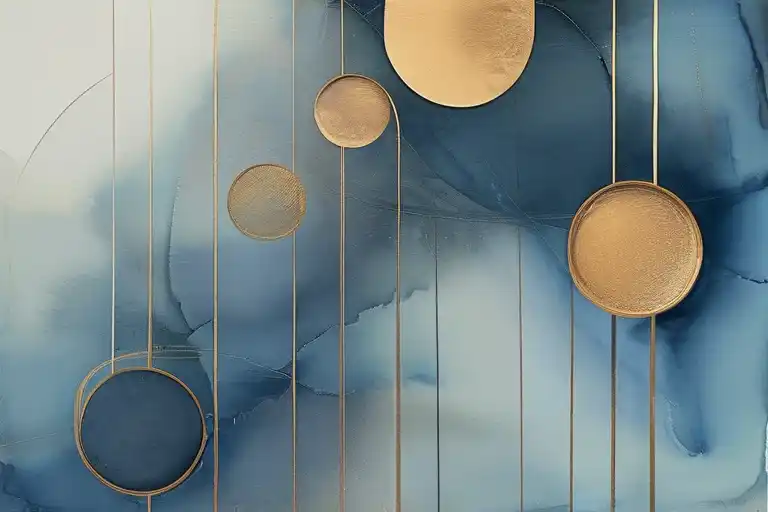The golden light of late afternoon streamed through the living room window, catching motes of dust that swirled like tiny galaxies in the air. I sat curled on the couch, knees drawn up, watching those specks dance—weightless, directionless, yet somehow beautiful in their chaotic patterns. My fingers absently traced the frayed edge of a cushion seam as my thoughts spiraled in much the same way: writing projects half-started, travel plans pinned on maps, creative ideas scribbled in margins of notebooks. So many possibilities, so little certainty.
A rhythmic rustling broke through my reverie—the sound of fabric being folded with practiced efficiency. My mother worked quietly across from me, her faded blue blouse sleeves rolled up to her elbows, a loose strand of hair escaping her bun as she smoothed a wrinkle from a freshly laundered shirt. The domestic normalcy of the scene contrasted sharply with the storm of career uncertainty in my mind.
‘You’re quieter than usual today,’ she remarked without looking up, her hands continuing their methodical work. The shirt formed neat rectangles beneath her fingers, each fold deliberate and precise—everything my scattered ambitions weren’t.
I swallowed around the lump in my throat. ‘I keep thinking…’ My voice trailed off as I watched another dust mote catch the light before disappearing into shadow. How could I explain this fear that had been gnawing at me for months? The terror that my multipotentialite nature—my love for writing, photography, linguistics, a dozen other things—wasn’t a gift but a curse that would leave me perpetually unaccomplished?
Mom placed the folded shirt atop the growing pile and finally met my eyes. In the softening light, her gaze held neither judgment nor impatience, only quiet readiness. The kind of look that had welcomed my childhood confessions of scraped knees and broken toys. Only now the bruises weren’t on my skin but on my sense of self.
Outside, a car passed by, its tires humming against pavement in a momentary disruption. The sound mirrored how I felt—in motion but going nowhere in particular. I tugged at the loose thread on the cushion until it snapped. ‘What if wanting everything means I’ll end up being nothing?’ The words tumbled out raw and unfiltered, the core fear I’d been too ashamed to voice even to myself.
The folding paused. For three heartbeats, the only movement was the slow drift of dust through sunlight. Then my mother reached for another shirt from the basket—one of my old band tees, its print cracked with age—and began the familiar ritual of sleeves-in, fold-over, smooth-down. ‘Tell me,’ she said as she worked, ‘who decided that being many things is the same as being nothing?’
Who Said There’s Only One Right Answer?
The living room was bathed in the golden glow of late afternoon, dust particles floating lazily in the sunbeams like tiny dancers suspended in time. I sat curled up on the couch, knees pulled to my chest, watching my mother methodically fold laundry across from me. The rhythmic sound of fabric being smoothed and folded should have been soothing, but my mind was anything but calm.
“You’ve been quiet today,” my mother observed without looking up from the blue shirt she was folding into perfect thirds. Her hands moved with the practiced ease of someone who’d performed this domestic ritual thousands of times.
I hesitated, picking at a loose thread on my sleeve. “I just… I don’t know how to explain it,” I began, my voice barely above a whisper. “I feel like I want too many things in life, but I’m terrified that if I don’t choose just one, I’ll end up being nothing.”
My mother’s hands stilled momentarily before she placed the folded shirt on the growing pile beside her. “That’s a heavy burden to carry all by yourself,” she said gently.
I exhaled sharply, frustration bubbling up. “Everyone says you have to specialize to succeed. Pick one career, one passion, one path. But what if I can’t? What if I want to write novels and study marine biology and learn five languages and…” My voice trailed off as I gestured helplessly at the invisible weight pressing down on my shoulders.
My mother studied me for a long moment before asking a simple question that caught me completely off guard: “Who made that rule?”
“What?”
“Who decided that being many things means you’ll be nothing?” she clarified, her tone curious rather than confrontational. “Was it some all-knowing career guru? A wise old philosopher? Or…” she tilted her head slightly, “maybe it’s just something we’ve all been told so often we stopped questioning it?”
I opened my mouth to respond but found I had no answer. The silence stretched between us, filled only by the distant hum of a lawnmower somewhere down the street.
“When I was your age,” my mother continued, picking up another shirt from the basket, “I believed the same thing. That I had to choose – college or work, marriage or career, stability or adventure. But life isn’t a multiple-choice test with one correct answer.”
She paused her folding to look directly at me. “Do you know what percentage of young people feel pressured to specialize in just one area?” Without waiting for my guess, she answered: “Nearly 80% of Gen Z reports experiencing what researchers call ‘focus pressure’ – this idea that you must narrow your interests to succeed.”
I blinked in surprise. “There’s actual research about this?”
“Of course,” she nodded, resuming her folding. “The world is full of people who don’t fit neatly into single categories. Artists who love math. Scientists who write poetry. Engineers who paint. We call them ‘multipotentialites’ – people with many passions and potentials.”
As sunlight shifted across the floorboards, illuminating the dust motes in new patterns, I felt something inside me shift too. The tight knot of anxiety in my chest began to loosen just slightly. Maybe I wasn’t broken for wanting multiple things. Maybe the problem wasn’t my diverse interests, but the outdated idea that they needed to be narrowed down.
My mother’s voice softened as she added, “The most interesting people I’ve known were never just one thing. They were explorers, collectors of experiences. And you know what? They were also some of the happiest.”
Outside, the golden light began to deepen into amber, casting long shadows across the room. The dust motes still danced, but now their movement seemed less chaotic, more purposeful – like possibilities waiting to be discovered rather than problems to be solved.
“You Are Everything Because You Dare to Dream”
My mother’s hands stilled over the half-folded shirt as she considered my confession. Outside, a breeze rustled the curtains, sending dust motes swirling in new patterns through the afternoon light.
“You remind me of someone I once knew,” she said, her voice carrying the warmth of shared recognition. “Leonardo da Vinci spent years jumping between painting, engineering, anatomy—they called him ‘dilettante’ behind his back.”
I uncurled slightly from my defensive posture. “The Mona Lisa guy? But he’s…”
“A ‘genius’?” She arched an eyebrow. “Or just someone who refused to choose?” Her fingers traced the shirt’s crease. “They never found his notebooks full of unfinished inventions. Just the ones history decided were important.”
A truck rumbled past outside, its vibration making the water glass on the table shiver. The sound faded into the quiet before she spoke again.
“Success isn’t about gold medals,” she said, pressing the folded collar with her thumb. “It’s about waking up excited to try. That writer you admire—” she nodded toward my dog-eared copy of Bird by Bird on the coffee table “—do you think she measured her life in bestseller lists? Or in mornings when the words flowed just right?”
I felt my shoulders drop against the couch cushions. The tightness in my chest began to unravel like a spool of thread.
“You’re not failing by exploring,” she said, emphasizing each word. “You’re succeeding at being fully alive.”
Through the window, the golden light had deepened to amber, painting long rectangles across the hardwood floor. Somewhere in the neighborhood, a child laughed—a bright, unfettered sound that seemed to echo my mother’s point.
She reached for another shirt from the laundry basket, this one my old high school theater T-shirt with its peeling decal. “Remember when you quit volleyball for set design?” A smile played at the corners of her mouth. “That teacher said you’d never commit to anything.”
“Mr. Grayson,” I groaned. “He told me—”
“—that dilettantes die mediocre,” she finished, rolling her eyes. “And yet here you are. Alive. Creating. Definitely not mediocre.” She tossed the folded shirt at me with playful precision. “Though your free throw could use work.”
Laughter surprised us both, bouncing off the walls like the afternoon light. In that moment, the fears that had coiled around my ribs all week—too scattered, not serious enough, wasting potential—loosened their grip. The dust motes still danced, but now their movement seemed less chaotic than… possibility in motion.
My mother returned to her folding, the rhythm of her hands steady and sure. “Multipotentialite,” she said, testing the unfamiliar word. “Sounds better than ‘dilettante,’ doesn’t it?”
Through the window, the first fireflies of evening blinked awake beyond the glass. Somewhere between the laundry and the laughter, I’d begun to believe her.
Tools for Balancing Your Explorations
The Passion Quadrant Matrix
When you’re someone with multiple interests, it’s easy to feel overwhelmed by all the possibilities. That’s where the Passion Quadrant comes in—a simple way to categorize your pursuits based on two key factors: immediate joy and long-term value. Here’s how it works:
- ⚡ Lightning Strikes (High Joy/Low Commitment)
These are your “just for fun” activities—the weekend photography hobby, the occasional baking experiments. They light you up but don’t necessarily align with deeper goals. Example: “I love singing in the shower, but I’m not aiming for Broadway.” - 🌱 Slow Growth (High Value/Low Immediate Reward)
Pursuits that require patience, like learning a language or building a side business. They might feel tedious now but promise future fulfillment. Tip: Schedule small, consistent time blocks (“15 minutes daily”) to avoid burnout. - ⚗️ Alchemy Projects (High Joy/High Value)
Your sweet spot—activities that excite you and contribute to long-term aspirations. Case study: A graphic designer who teaches art classes, merging creative passion with income streams. - 📌 Practical Anchors (Low Joy/High Necessity)
The unglamorous but essential tasks (taxes, grocery shopping). Strategy: Pair them with enjoyable elements (listen to podcasts while organizing files).
Try this: List your current interests on sticky notes and physically arrange them into these quadrants. Seeing them visually often reveals surprising patterns.
3 Communication Scripts for Critics
When family members or colleagues question your “lack of focus,” these responses can help:
- The Bridge Builder
*”I understand you want what’s best for me. Right now, exploring different paths *is* how I’m figuring that out.”*
→ Validates their concern while asserting your autonomy. - The Perspective Shifter
*”Did you know Charles Darwin studied medicine, theology, *and* beetle collecting before evolutionary theory?”*
→ Uses historical examples to normalize nonlinear journeys. - The Boundary Setter
“I appreciate your input, but I need space to make my own discoveries.”
→ Firm yet polite, especially for persistent doubters.
Pro tip: Practice these aloud in front of a mirror. Confidence in delivery often disarms critics more than the words themselves.
Real-Life Multipotentialites (Case Studies)
- The Lawyer-Turned-Potter
After 7 years in corporate law, Mia transitioned to running a ceramics studio. “My legal training actually helps with contracts and marketing—nothing is wasted.” - The Engineer-Artist Hybrid
Raj maintains a tech career while selling abstract paintings. “Coding satisfies my logical side; painting feeds my soul. I don’t have to choose.” - The Serial Skill Collector
Lena has cycled through careers in nursing, floral design, and now dog training. “Each phase taught me transferable skills like patience and observation.”
Your Turn: Small Steps Forward
- Weekly “Explorer’s Hour”
Dedicate 60 minutes to dabble in something new—no mastery required. - The “And” Exercise
Replace “but” with “and” in self-talk: “I love writing AND coding—they’re not mutually exclusive.” - Track Your Cross-Pollination
Note when skills from one area unexpectedly help another (e.g., musical rhythm improving public speaking pacing).
Remember: You’re not scattered—you’re cultivating a diverse mental ecosystem where ideas fertilize each other. As the sunlight fades from our opening scene, know that some answers emerge slowly, like shadows lengthening across the floor. What small step will you take today?
The Fading Light and What Remains
The golden streaks of sunlight had retreated further across the wooden floorboards, leaving only faint traces where dust particles had danced hours earlier. My mother’s folded laundry sat neatly stacked on the coffee table between us – orderly squares of cotton and denim that contrasted with the messy sprawl of my thoughts.
She reached for the last sock to pair, her fingers moving automatically through the familiar motion. ‘You know,’ she said without looking up, ‘when I was folding your baby clothes, I never imagined all the versions of you I’d get to meet.’ The corner of her mouth lifted. ‘The painter who covered our fridge in watercolors. The debate champion who practiced speeches at breakfast. The midnight poet who left notebooks everywhere.’
I ran my palm across the warm floorboards where the sunlight had been. The wood still held traces of its heat, like memories lingering after vivid experiences.
‘What small thing did you try today?’ she asked suddenly. The question floated between us, light as the dust motes we’d watched earlier.
At my hesitation, she continued: ‘Not everything has to be grand. Last Tuesday you tried that Ethiopian coffee. Two weeks ago it was the origami tutorial.’ She gestured to the lopsided paper crane still sitting on our bookshelf. ‘Those count too.’
Some reader responses we’ve loved:
“—Finally clicked ‘purchase’ on that online pottery class”
“—Asked my barista how to pronounce ‘matcha’ properly”
“—Wore mismatched socks just because”
The last sliver of sunlight disappeared behind the rooftops across the street, but the room didn’t fall into darkness. The lamps we’d turned on earlier glowed steadily, their light less dramatic but more enduring. My mother’s question hung in the air, not demanding achievement but celebrating curiosity.
Perhaps this was the answer all along – not a single brilliant flash of purpose, but countless small sparks of trying. The courage to taste unfamiliar flavors, attempt clumsy creations, and collect experiences like scattered laundry waiting to be folded into understanding. The light changes, but what it touches remains.
What faint glow lingers from your today?
The Path Without a Map, But With a Compass
The golden light had faded completely now, leaving only the faintest traces of warmth on the wooden floorboards. The dust had settled, no longer dancing in the air, but the room didn’t feel empty—it felt full of possibilities. My mother’s words echoed in the quiet space between us: “You’re everything because you have the courage to dream in the first place.”
I realized then that life doesn’t come with a predetermined map. There are no guaranteed routes to success, no single destination we’re all meant to reach. The beauty lies in the wandering—in the unexpected detours and the side paths we choose to explore. What we carry with us isn’t a set of directions, but something far more valuable: our own inner compass.
This compass isn’t about pointing north or south; it’s about knowing what brings you joy, what sparks your curiosity, and what makes you feel alive. It’s about understanding that being “lost” is often just another way of being open—open to new experiences, to growth, to the simple truth that you don’t have to be one thing to be something.
As the last streaks of sunlight disappeared, I noticed something I hadn’t before: the way the fading light made ordinary things—the edge of a bookshelf, the curve of a coffee mug—look different, softer, full of potential. Maybe that’s what this journey is about. Not about having all the answers, but about learning to see the questions differently.
So here’s what I want to leave you with: You don’t need a map when you have a compass. You don’t need to know the entire path when you know the next step feels right. And you certainly don’t need to be just one thing in a world that’s infinitely varied and changing.
What small step will you take today toward honoring your many possibilities?
— The conversation continues in the comments. What’s your compass pointing toward right now?





